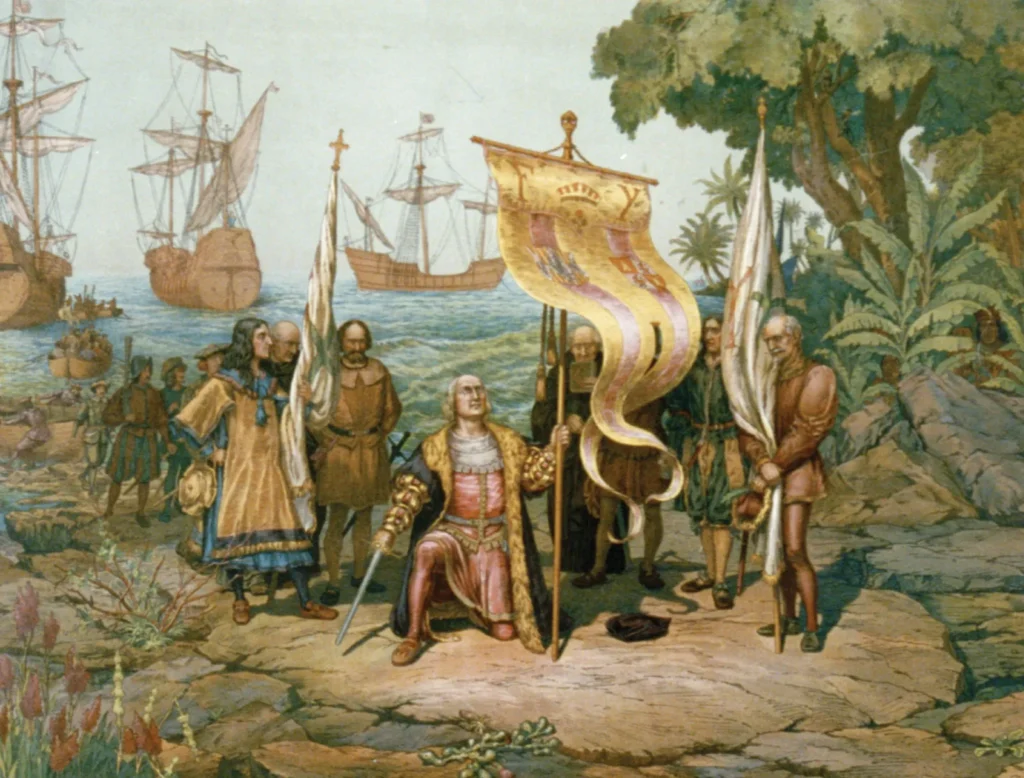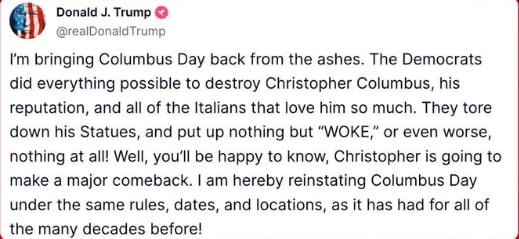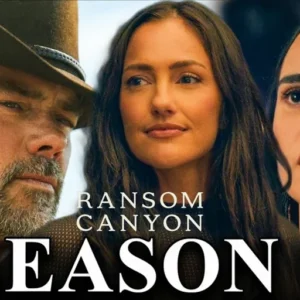In a bold and polarizing announcement, President Donald J. Trump declared on April 27, 2025, that he is “bringing Columbus Day back from the ashes,” signaling his intent to reinstate the federal holiday as a singular celebration of Christopher Columbus. The proclamation comes as a direct response to former President Joe Biden’s 2021 executive action, which officially recognized Indigenous Peoples’ Day on the second Monday of October, coinciding with Columbus Day. Trump’s statement, widely circulated across platforms like X and reported by outlets such as Fox News, has reignited a decades-long debate over the legacy of Columbus, the treatment of Indigenous peoples, and the role of federal holidays in shaping national identity.
A Controversial Holiday’s History

Columbus Day, established as a federal holiday in 1937, commemorates Christopher Columbus’s 1492 arrival in the Americas. For much of the 20th century, it was celebrated as a symbol of exploration and discovery, particularly among Italian-American communities who viewed Columbus as a cultural hero. However, by the late 20th and early 21st centuries, the holiday faced growing criticism for glossing over Columbus’s role in initiating centuries of colonial violence, enslavement, and disease that devastated Indigenous populations.
In response to these critiques, advocacy for Indigenous Peoples’ Day gained momentum. The movement, which began in the 1970s, sought to honor the resilience and contributions of Native American communities while acknowledging the historical injustices they endured. By 2021, President Biden became the first U.S. president to formally proclaim Indigenous Peoples’ Day as a federal observance, aligning it with Columbus Day. This dual recognition aimed to balance competing narratives but instead fueled tensions, with critics arguing it diluted the significance of both observances.
Trump’s recent pledge to “reinstate” Columbus Day as the sole federal holiday on the second Monday of October has thrust this cultural fault line back into the spotlight. Speaking at a rally in Ohio, Trump framed his decision as a restoration of American pride and tradition, accusing Democrats of erasing history. “They tried to cancel Columbus, but I’m bringing him back—bigger and better than ever,” he said, to roaring applause.
The Political Backdrop

Trump’s announcement is emblematic of his broader political strategy: leveraging cultural wedge issues to galvanize his base. Posts on X reflect a polarized public response, with supporters like @Johnnypatriot64 praising Trump for “loving America” and restoring a holiday they view as unfairly maligned. Others, such as @Meidas_LaurenA, highlight the political motivations behind the move, noting Trump’s tendency to frame Democrats as anti-American.
The timing of the announcement is significant. With the 2026 midterm elections looming, Trump appears to be doubling down on issues that resonate with conservative voters, particularly those who feel alienated by progressive efforts to reinterpret historical figures and holidays. By championing Columbus Day, Trump taps into a narrative of cultural preservation, appealing to constituencies like Italian-American voters and those wary of what they perceive as “woke” overreach.
However, the move risks alienating other groups, including Native American communities and progressive voters who view Indigenous Peoples’ Day as a long-overdue acknowledgment of historical truths. The White House’s official X account amplified Trump’s statement, but it offered no details on how the policy would be implemented or whether Indigenous Peoples’ Day would be entirely rescinded.
The Case for Columbus Day
Supporters of Trump’s plan argue that Columbus Day is a vital part of American heritage. For Italian-Americans, Columbus symbolizes their community’s contributions to the United States, particularly during a time when they faced discrimination. Organizations like the National Italian American Foundation have long defended the holiday, emphasizing Columbus’s role as a navigator and cultural bridge between Europe and the Americas.
Conservative commentators on X and elsewhere contend that the push to replace Columbus Day with Indigenous Peoples’ Day is an attempt to rewrite history through a modern lens. They argue that Columbus’s voyages, while flawed, were pivotal in shaping the modern world. “It should never have been forgotten,” wrote @Johnnypatriot64, echoing a sentiment shared by many Trump supporters.
Critics of Indigenous Peoples’ Day also point out that the term can feel overly broad, encompassing diverse Native cultures under a single label. Some argue that a separate holiday, distinct from Columbus Day, would better serve the goal of honoring Indigenous contributions without erasing other historical narratives.
The Case for Indigenous Peoples’ Day
Opponents of Trump’s plan, including Native American activists and progressive leaders, argue that reinstating Columbus Day as the sole federal holiday dismisses centuries of Indigenous suffering. They point to historical records showing Columbus’s brutal treatment of Native peoples, including enslavement and violence, as documented in his own journals and later accounts by Spanish chroniclers. The arrival of Europeans, they argue, set off a catastrophic chain of events, including disease and displacement, that reduced Indigenous populations by millions.
Indigenous Peoples’ Day, by contrast, is seen as a step toward reckoning with this history. Advocates like the National Congress of American Indians emphasize that the holiday celebrates Native resilience, cultural diversity, and ongoing contributions to society. Over 100 cities and several states, including California and New Mexico, have replaced Columbus Day with Indigenous Peoples’ Day at the local level, reflecting growing public support.
On X, users like @realTuckFrumper have pushed back against Trump’s narrative, noting that Biden did not “cancel” Columbus Day but rather celebrated both holidays. They argue that Trump’s rhetoric misrepresents the issue, framing it as a zero-sum conflict when coexistence is possible.
The Legal and Practical Challenges
Implementing Trump’s plan may face significant hurdles. Federal holidays are established by Congress, and while presidents can issue proclamations, changing the status of Columbus Day or Indigenous Peoples’ Day would likely require legislative action. Biden’s 2021 proclamation did not eliminate Columbus Day but added Indigenous Peoples’ Day as a concurrent observance, leaving the legal status of both intact. Reversing this could involve complex negotiations in a divided Congress.
Moreover, public opinion is split. A 2023 Pew Research Center poll found that 38% of Americans supported replacing Columbus Day with Indigenous Peoples’ Day, 32% favored keeping Columbus Day, and 27% supported recognizing both. This division suggests that any attempt to prioritize one holiday over the other could provoke backlash.
Logistically, federal agencies, schools, and businesses would need to adjust to a reinstated Columbus Day. States and municipalities that have adopted Indigenous Peoples’ Day may resist federal pressure, potentially leading to a patchwork of observances across the country. The debate could also spill into the courts, with advocacy groups on both sides prepared to challenge any changes.
A Broader Cultural Reckoning
Trump’s Columbus Day pledge is part of a larger cultural reckoning over how the United States commemorates its history. Similar debates have unfolded over Confederate monuments, the legacy of Founding Fathers who owned slaves, and the renaming of institutions tied to controversial figures. Each controversy raises questions about whose stories are centered in the national narrative and how to balance historical complexity with modern values.
For Native Americans, the fight for Indigenous Peoples’ Day is inseparable from broader struggles for sovereignty, land rights, and cultural recognition. Leaders like Deb Haaland, the first Native American Secretary of the Interior, have called for a more inclusive approach to history, one that acknowledges painful truths while celebrating resilience.
Meanwhile, defenders of Columbus Day argue that erasing traditional holidays risks alienating communities and oversimplifying history. They advocate for education that contextualizes Columbus’s legacy without vilifying or idolizing him.



